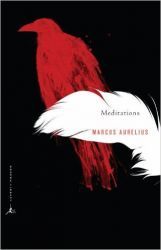Nat Dollin • • 6 min read
The Marcus Aurelius Guide to Stoic Journaling

Do you ever contemplate the many facets of your existence? Chances are, if you’re reading this article, you probably do.
What about the characters in your life—do you feel as if you’ve chosen them? Do they add value to your life, and you to theirs? What kind of value? Are you conscious of how they might be influencing you?
Do you ever choose to write down the fruits of your contemplations? Do you ever harness the flow of your thoughts to a page with no particular end in mind?
That’s what Marcus Aurelius was doing around AD 170 – 175. What have come to be known as his Meditations began purely as personal, written explorations which were never intended for publication.
Posthumously, his notes were divided into twelve chapters—or “books”—each one of which offers us a plethora of timeless existential insights, maxims and, perhaps most importantly, questions that encourage the reader to reflect directly on his/her own life, as opposed to merely observing the philosopher’s viewpoint from a detached position.

For today, I’d like to focus on the first book, which is unlike the eleven that follow. In it, Aurelius pays eloquent homage to the honourable qualities of his nearest and dearest; an observation of his gratitude to those who had directed, influenced, and improved upon his life.
Aside from providing insight into what personal characteristics Aurelius himself deemed to be exemplary, this particular collection serves as inspiration for us to consider the admirable attributes inherent in those by whom we are most influenced. Note here, that we are not necessarily speaking exclusively of friends. Aurelius also wrote about family, teachers, colleagues, and gods.
Their common denominator was that they had a profoundly positive impact on Aurelius’ life, so much so that he saw it fit to detail in black and white exactly what he had recognised in them and how it had, in turn, encouraged him to behave.
15 Marks of Good Character
(according to Marcus Aurelius)
I find the following selection of observances to be particularly inspiring when I see them through the lens of modernity:
Note: I have paraphrased the translation of Book 1 that I have in my possession, in order to compile a list of guidances as opposed to personal observations as originally chronicled by Aurelius. For example, a direct quote of #1 would read “To work with my own hands, and mind my own business.”
1. Work with your own hands, and mind your own business
2. Avoid empty enthusiasms
3. Always carry the same demeanor, unchanged in sudden pain
4. Combine intensity and relaxation
5. Avoid impatience in explanation
6. Tolerate the emptily opinionated
7. Praise without fanfare, and wear great learning lightly
8. Never say or write to anyone that you are “too busy”
9. Develop self-mastery, immunize yourself against passing whims
10. Be neither hurried nor hesitant
11. Become your own master in all things, and serene with it
12. Maintain foresight with respect to long-term issues, and cultivate unfussy control with respect to smaller details
13. Enjoy the comforts that life has afforded you with neither pride nor apology—no routine acceptance of their presence, or regret in their absence
14. Focus on what needs to be done, not the glory of its doing
15. Regulate abstinence and enjoyment
What strikes me as pertinent when reading the first book is how Aurelius humbly ascribes his accumulated wisdom to those with whom he shared his life. The chapter in its entirety is dense with astute observations that exhibit the Philosopher-Emperor’s acute attention to detail, not to mention a sincere interest in consistent self-development.
His choice to reflect upon the sources of his most valued characteristics makes me wonder: Who is currently influencing me? How are they improving upon my life? And what characteristics of theirs have I allowed to shape me?
How To Take Inventory of Your Life
Taking stock of our life’s content can be a worthwhile exercise if we are to sustain a genuine interest in growth and general understanding. This is why we included the Proust’s Pupil challenge in 30 Challenges to Enlightenment.
It can take whatever form the individual might benefit from most on any given day.
The spark for this particular practice was kindled in me about a year ago, when I was staying with a friend who is part of the recovery community.
One night, when she was trying to get some homework done before meeting with her sponsor, I asked if I could take a look. I myself had no prior knowledge of the recovery process, but I’m glad I didn’t let that curb my curiosity.
As with many “big books” written over the course of literary history, a recurrent theme in my own life is that sources we might ordinarily overlook often contain some of the most profitable lessons and teachings.
My friend was working on what is referred to as The Fourth Step: Making a searching and fearless moral inventory of oneself. Once she explained what that entailed, I asked if I could join her in writing one for myself. She laughed, and found it amusing that I would volunteer myself to a process that is known in AA to feel, at times, excruciating, but agreed that the steps could potentially prove useful to anyone and everyone, no matter their context.

Over a year later, I find myself returning more frequently to this practice of semi-formal contemplation, and have often found myself in unexpected—yet rewarding—territory.
It doesn’t necessarily uphold the rigors of AA’s particular template but, with a head-nod to Marcus Aurelius, I have found conducting an inventory of one’s greatest influencers to be a valuable process. It’s not always a comfortable one, and it can be time-consuming, but as Elena Brower comically reminded us in her memorable talk on Spiritual Partnership,
“This is one life you guys—can you sit down for five f***ing hours and do your homework?! I think so. I think it’s worth it.”
— Elena Brower
18 Questions To Ask Yourself To Journal Like Marcus Aurelius
“Truth rarely seems to ask the easier choice of us.”
— Deborah Adele
When discussing Truthfulness (or “Satya”) as explored through the lens of Yogic Philosophy, Deborah Adele highlights how truth can change, and how important it is to “get and stay current with yourself.”
What we had once assumed to be a given, may perhaps deserve closer inspection. Certain relationships may hold more (or less) value than we currently realize. Sometimes I find it helpful to begin with a general review of my current situation, with questions such as:
When do I feel the most alive?
What am I passionate about?
What are my best memories?
What makes me sad?
What makes me frustrated or indignant?
When do I lose control of my emotions?
What daily activities bring pain and suffering to my life?
What daily activities add value to my life?
Who brings joy and positivity to my life?
Who brings strife and negativity?
From there, we can hone in on the particular individuals we are currently sharing our life with:
Who influences you?
Who guides your direction?
Who improves your life?
Who inspires you?
What characteristics do you admire in these individuals?
What characteristics inspire your own behaviour as a result?
Which relationships are serving neither party, and why?
By taking inventory of our relationships, we afford ourselves the Aurelius-esque opportunity to establish active gratitude towards those we admire.
Simultaneously, if we find it difficult to detail admirable qualities in any individuals with whom we are currently spending a lot of time, we can use the inventory to help re-evaluate which relationships are mutually beneficial, and which no longer offer reciprocity.
The most warming takeaway from this exercise is how we are able to enhance our daily awareness of the unique or inspiring characteristics of those with whom we are truly fortunate to have crossed paths. What begins as a serious approach to the everyday facets of our lives can in fact lead to a rare sweetness found in renewed appreciation.
HighExistence has created a new spiritual tool to help you awaken. You’re going to want to see this.
Meditations
by Marcus Aurelius

Meditations is a timeless work, in every sense of the word. It is a book everyone should have read once. Whether devouring every chapter in its entirety, or dipping in for one maxim at a time, the reflections of this remarkable thinker hold value for all readers, no matter our stage in life.










